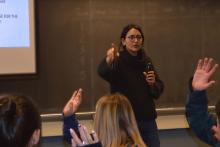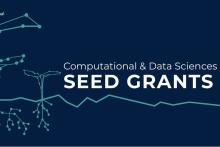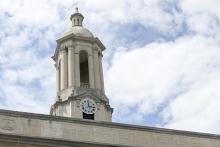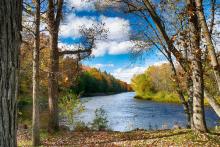Saumya Vaishnava, a doctoral student in the Penn State Department of Geography, has received a 2021 Harold F. Martin Graduate Assistant Outstanding Teaching Award, which is sponsored jointly by the Graduate School and the Office of the Vice President and Dean for Undergraduate Education.
Most college students with summer internships prepare for those opportunities by, at a minimum, packing their bags and securing housing but Melissa Manno rarely settles for the minimum.
From making our roads safer to paving the way to exoplanet discovery, the Institute for Computational and Data Sciences (ICDS) seed grants have funded 14 projects backed by researchers from across the disciplines and around the University.
Erica Smithwick, Penn State distinguished professor of geography and associate director of the Institutes of Energy and the Environment, was selected as an Administrative Fellow for the 2021–22 academic year.
Despite the devastating impact the emrald ash borer has had on forests in the eastern and midwestern parts of the U.S., climate change will have a much larger and widespread impact on these landscapes through the end of the century, according to researchers.
Hannah Perrelli knows exactly what drew her to the College of Earth and Mineral Sciences (EMS). It was the camaraderie between students and the engagement with faculty, staff and alumni who frequented the University Park campus.
Cultural diversity — indicated by linguistic diversity — and biodiversity are linked, and their connection may be another way to preserve both natural environments and Indigenous populations in Africa and perhaps worldwide, according to an international team of researchers.
Increasingly aggressive strategies are needed to reduce current and future carbon emissions and proactively remove carbon-based heat-trapping gasses that have been emitted to date. A panel of experts will discuss this topic during the webinar “Getting to negative: strategies, ethics and co-benefits.”
Eleven students were named College of Earth and Mineral Sciences (EMS) Academy for Global Experience, or EMSAGE laureates this spring semester. The honor shows these students excelled in broad categories of scholarship, experiential learning and global literacy, and service.
Penn State's College of Earth and Mineral Sciences (EMS) recognized exceptional students and faculty for their academic excellence, service and leadership during its annual Wilson Awards Celebration, held virtually on Sunday, April 11. The Wilson Awards are named in honor of Matthew and Anne Wilson, major benefactors of the college.











